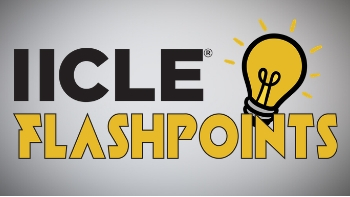1.llinois Supreme Court amends rules to support use of remote hearings in court proceedings. The Supreme Court has announced changes to several Rules to facilitate the use of technology for remote hearings. The Court repealed Supreme Court Rule 185, created a new Rule 45, and amended Rules 46 and 241.- Rule 185, which was repealed, involved the use of telephone or video conferencing in civil cases.- New Rule 45 provides that the court may, upon request or on its own order, allow a case participant to participate remotely, including by telephone or video conference. This rule applies to both civil and criminal cases.- Amended Rule 46 allows, for the first time, for the recording from a video conference hearing to be used by the official court reporter to make the transcript that becomes the official record of proceeding.- Amended Rule 241 provides that the court may allow a case participant to testify or otherwise participate in a civil trial or evidentiary hearing by video conferencing from a remote location.The complete press release with links to the new Illinois Supreme Court Rules can be found here.The Supreme Court has also issued a “Remote Court Proceedings – Guidance Document” which lists best practices and offers guidance for Illinois courts with respect to operating virtual courtrooms. View it here.2.Illinois Supreme Court Issues guidelines for resuming court proceedings during COVID-19 Pandemic. The Illinois Supreme Court has issued both an order and operational guidelines to assist in the re-opening of Illinois courts during the pandemic. The order permits each circuit to return to hearing all court matters either in-person or remotely according to a schedule adopted by the chief judge of each individual circuit. The promulgated guidelines recognizes that each circuit is positioned to address the COVID-19 challenges based on local conditions and directs that the courts consider the health and safety of court personnel, litigants, and the public, as well as rethinking what court appearances will now look like.The Supreme Court order can be found here.The Operational Guidelines can be found here.3.Remote notarization and witnesses. Senate Bill 2135 has passed both chambers and will take effect immediately upon the Governor signing the bill. The new statute will effectively codify Illinois Executive Order 2020-14 which permits documents to be witnessed by a notary through two-way audio-video communication provided several procedural requirements and protocols are met. The Notary Public commissioned in Illinois must be physically within the State while performing the notarial act. Additionally, the two-way audio-video communication must be recorded and preserved for a period of at least three (3) years. There are several procedural requirements to follow and record on the two-way audio-communication, including the notary, witnesses, and signatory attesting that they are physically located in the State of Illinois during the act, and sufficiently recording the document which is being executed and the signing itself. A full copy of the proposed statute (5 ILCS 175/95-20) can be found here.4.Husband’s breach of contract action against wife regarding postnuptial agreement dismissed with sanctions. Husband brought a breach of contract action against wife alleging she breached the parties’ postnuptial agreement by challenging its validity, and that he was damaged because he was required to expend funds to defend the validity of the postnuptial agreement. Under the terms of the postnuptial agreement, in the event of a divorce, husband was required to pay all of his own legal fees and a portion of wife’s legal fees. Wife filed a motion to dismiss which the trial court granted. In his claim, which was brought separate and apart from the pending dissolution of marriage action, husband attempted to distinguish between his legal fees and damages in a breach of contract complaint. However, the Appellate Court noted that husband was essentially attempting to make wife pay for his fees and costs associated with the defense of the validity of the postnuptial agreement. The Appellate Court upheld the dismissal of the breach of contract. The contract claim and the dissolution of marriage action involved the same parties, were based on substantially the same facts, and arose from the same occurrence. Because there was another action pending with the same parties and the same cause, dismissal was proper. The Court further noted that dissolution proceedings are designed to dispose of all matters connected with the dissolution of a marriage. The Appellate Court also imposed sanctions on husband and called his contact action a “dubious complaint” and the appeal a “meritless appeal” and required him to pay all of wife’s fees and costs incurred in connection of the breach of contract action. His action unnecessarily extended the proceedings between the parties. Davis v. Davis, 2019 IL App (3d) 170744.
Jun 01, 2020
Family Law Flash Points - June 2020

News and Insights
Feb 05, 2026
Teaching What Matters Most: A Conversation with Partner Erika Wyatt
If you ask Partner Erika Wyatt what keeps her returning to the University of Chicago Law ...
Jan 21, 2026
Schiller DuCanto & Fleck LLP Announces 2026 Illinois Super Lawyers and Rising Stars Honorees
Chicago, IL — January 21, 2026 — Schiller DuCanto & Fleck LLP is pleased to announce ...
Jan 05, 2026
Jessica Bank Interlandi Elevated to Senior Partner at Schiller DuCanto & Fleck
Chicago, IL — January 5, 2025 — Schiller DuCanto & Fleck LLP is pleased to ...
